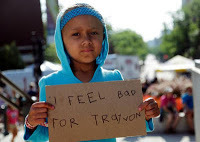Multiple Identity Syndrome: Writing Someone Else's Oppression, Part II
 A thoughtful recent post on Everyday Feminism pointed out the problem of people getting bristly when told they are privileged. Personally, if I had a pound for every time I've run across a 'I'm white and I'm not privileged: I was the victim of anti-gay hate crimes/grew up dirt-poor/am disabled and I worked for everything I have' post in response to a discussion of white privilege, I'd probably be able to swim in a giant money pit like Scrooge McDuck.
A thoughtful recent post on Everyday Feminism pointed out the problem of people getting bristly when told they are privileged. Personally, if I had a pound for every time I've run across a 'I'm white and I'm not privileged: I was the victim of anti-gay hate crimes/grew up dirt-poor/am disabled and I worked for everything I have' post in response to a discussion of white privilege, I'd probably be able to swim in a giant money pit like Scrooge McDuck.The reason for these posts isn't precisely 'ignorance', nor is it necessarily a one-sided communication failure: we've got one side being defensive and refusing to listen, and another which can sometimes come off as implying that 'having privilege' means 'if you are able-bodied/wealthy/male/whatever, your life is perfect and you do not understand adversity'.
Rather, it's something more complex-- the interaction of multiple identities and areas of privilege and oppression throughout our society. The article I cited above doesn't really delve into the idea that having identity privilege in one area doesn't mean having it in another. For example, a straight, black man in the United States would experience 'straight privilege' from his sexual orientation, since he operates a world that assumes he's heterosexual and affirms his romantic relationships; however, he can simultaneously experience racial oppression when surrounded by a dominant culture which codes his behaviour 'threatening' or 'suspicious' even if he's just popping into the grocery store. At the same time, we can have a white man with a mental illness, who may have white privilege in some circumstances--for example, he might not been seen as a potential shoplifter and harassed by store staff-- but he's actually even more likely than the neurotypical black guy in the previous example to be the victim of a violent hate crime.
Those are just two examples, which don't even delve into individual life stories. So when you're thinking about a character, it's a trap to imagine only one facet of their identity as meaning they must by default have everything sorted out. Think of them as a whole, with multiple layers of identity which influence how they interact with society and ingrained systems of oppression.
Published on August 30, 2013 01:44
No comments have been added yet.



